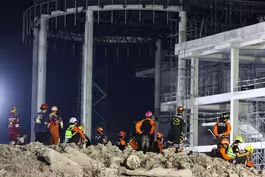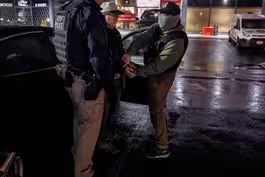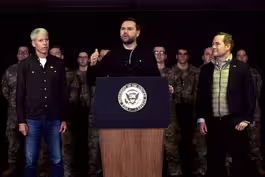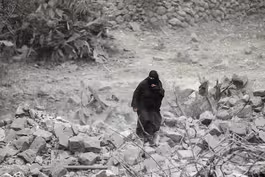
'In Covid's Wake' criticizes government's pandemic response
Clip: 3/28/2025 | 8m 5sVideo has Closed Captions
Authors of 'In Covid's Wake' on their criticism of the government's pandemic response
Five years ago, the World Health Organization declared the outbreak of COVID-19 a pandemic. That launched widespread shutdowns, mandates for masks and vaccines and caused enormous social and economic harms. William Brangham spoke with the authors of "In Covid's Wake: How Our Politics Failed Us," a new book that’s sharply critical of how America responded to this crisis.
Problems playing video? | Closed Captioning Feedback
Problems playing video? | Closed Captioning Feedback
Major corporate funding for the PBS News Hour is provided by BDO, BNSF, Consumer Cellular, American Cruise Lines, and Raymond James. Funding for the PBS NewsHour Weekend is provided by...

'In Covid's Wake' criticizes government's pandemic response
Clip: 3/28/2025 | 8m 5sVideo has Closed Captions
Five years ago, the World Health Organization declared the outbreak of COVID-19 a pandemic. That launched widespread shutdowns, mandates for masks and vaccines and caused enormous social and economic harms. William Brangham spoke with the authors of "In Covid's Wake: How Our Politics Failed Us," a new book that’s sharply critical of how America responded to this crisis.
Problems playing video? | Closed Captioning Feedback
How to Watch PBS News Hour
PBS News Hour is available to stream on pbs.org and the free PBS App, available on iPhone, Apple TV, Android TV, Android smartphones, Amazon Fire TV, Amazon Fire Tablet, Roku, Samsung Smart TV, and Vizio.
Providing Support for PBS.org
Learn Moreabout PBS online sponsorshipGEOFF BENNETT: Five years ago, the# World Health Organization declared## the outbreak of COVID-19 a pandemic,# and that launched widespread shutdowns,## mandates for masks and vaccines, and had# an enormous social and economic impact.
William Brangham speaks with the authors of a new## book that's sharply critical of how# the U.S. responded to the crisis.
WILLIAM BRANGHAM: that new book is called "In# COVID's Wake: How Our Politics Failed Us."
And it looks back at how critical American# institutions, the government, academia,## and the press among them, performed# during the pandemic, and how their## response inflamed distrust, cracked down on# dissent, and cost the country tremendously.
Its authors are two political# scientists from Princeton University,## Stephen Macedo and Frances# Lee.
And they join us now.
Welcome to you both.
One of the main themes of this book#as it seems to me, is that, in the early,## crazy days of this pandemic, as our leaders# were debating lockdowns, how to respond,## that any dissent over or real debate about the# costs and benefits of those actions was squelched.
STEPHEN MACEDO, Co-Author, "In COVID's Wake: How# Our Politics Failed Us": Well, it's interesting.
In March 2020, as the lockdowns were being# enacte.. Western countries, there were dissenters who# spoke up in March.
Some very well-known people## warned that these measures were unlikely# to be successful and would be very costly.
And then consensus seemed to develop# in April and May that these kinds of## strategies enacted by the Chinese and# that had been implemented in Italy,## national lockdown and across much of the United# States, that that was the correct strategy,## that everyone needed to be on board for it,# that there needed to be a sense of vital unity,## that government, the academy, science,# journalism all needed to pull together,## and that this was what we were going to# do and that this is what we needed to do.
And, indeed, at that point, voices of# dissent became scarce.
Social media## companies began removing some postings# that were at odds with government## messaging, and dissent dwindled# over the summer and into the fall.
WILLIAM BRANGHAM: Frances, one of the# things that was a real revelation to## me was how you document in the book that,# prior to COVID, that there was a good deal## of analysis done about what happens# if a respiratory virus does emerge.
And the consensus or some version of# a consensus was that lockdowns are## not that effective and that they# would cost society enormously.
FRANCES LEE, Co-Author, "In COVID's Wake: How# Our Politics Failed Us": Yes, there had been## a tremendous amount of work planni.. And we took measures in the early# going of the pandemic that were## at odds with the recommendations.# They had been recommended against## in some cases.
There was a World Health# Organization report from November 2019## that looked at what was known about all the# proposed non-pharmaceutical interventions.
WILLIAM BRANGHAM: This is masks, shutdowns,# isolation, testing, tracing, et cetera.
FRANCES LEE: Business closures, school closures,## looked at what was known about the effectiveness# of each of those measure.. the report states that the evidence base for# the effectiveness of each of them was poor.
And so it's so striking that you get six months# later and those measures are being employed all## around the world, with policymakers saying# that they're following the science.
And,## of course, it's quite obvious that all# of those measures have tremendous costs.
So, as policymakers are# weighing their alternatives,## there's uncertain benefits, but certain costs.
STEPHEN MACEDO: I mean, there's one thing --# other thing in those pre-COVID pandemic plans## that's relevant to this question, which# is, those plans warn that science -- that## government officials, public officials# will be tempted to adopt these measures,## these stringent lockdown measures,# to show that they're in charge, to... WILLIAM BRANGHAM: To say, hey, we got this.
STEPHEN MACEDO: Yes, exactly, to take control.
And those pre-COVID plans are# emphatic in advising experts## and public health officials# to be frank with the public## about the thin evidentiary basis for them and# the certainty of costs.
So that was ignored.
Then, of course, there was# the World Health Organization,## a mission that went to China, came# back after spending a week there and## endorsed the Chinese strategy of# lockdowns without qualification,## and said that the entire world should follow this# path of strict lockdowns to suppress the virus.
There was a prediction that came out of --# based on mathematical models out of Imperial## College London that predicted 2.2 million deaths# in the United States by August 2020 if we didn't## implement these suite of measures that led# to a kind of panic, I think, and a failure## to consider rationally the costs of these# measures and the likelihood of their success.
WILLIAM BRANGHAM: There are a lot of public# health experts who look at our experience and say,## both in the heat of the moment and in what we have# subsequently learned, that keeping people apart,## that social distancing initially was# a critical part of protecting people.
And I wonder what -- what's your take on that?
FRANCES LEE: Well, that was a theory that, if# we could keep people apart, that we could b.. time before vaccines became available.
But# it had not been tried on any large scale.
And I think what was being overlooked# during that planning was the large## share of the work force that would have to# continue on the job regardless is about... WILLIAM BRANGHAM: The so-called essential workers.
FRANCES LEE: Essential workers is# about a third of t.. who had to continue doing their jobs# in person all through the lockdowns.
And so the virus has to continue# to spread under those conditions.
WILLIAM BRANGHAM: When you look at how different# states reacted here in the U.S., we did see## wildly different responses, some employing very# strict policies, others being a little looser.
What does the evidence show about# how those states worked out?
FRANCES LEE: There were lockdowns across the# U.S.; 43 governors issued stay-at-home orders.## Where you began to see the divergence in policy# across the U.S. is in the reopening process.
Democratic states stayed locked down for# 2.5 times as long as Republican states.## Even as Democratic states began to# reopen, they still maintained more## restrictions than Republican states.
But# when you look at cumulative COVID mortality## at the time the vaccine rollout started,# there's no difference between states that## pursued more stringent COVID containment# policies and states that were more lax.
We can't conclude from this that# means these measures don't work,## but it means that there's still a# lack of evidence that they do work.
WILLIAM BRANGHAM: Especially in light of what# we now know as the psychological, economic,## academic cost for children, for people,# for businesses all over this country.
FRANCES LEE: And also the fiscal# costs, the amount of borrowing that## was necessary to finance the shutdowns.# It's roughly equivalent as a share of GDP## to what we spent on The New Deal and# the 2009 financial rescue combined.
WILLIAM BRANGHAM: Does your authorship of# this book help you give us a sense of how we## ought to do things differently if and when,# most likely when, the next pandemic comes?
STEPHEN MACEDO: Yes, I would say so.
I think we need to make sure that we're open to.. comes from the other side.
One of the things# that we found is that the pandemic became## very polarized.
Democratic states were on one# side.
Republican states were on the other side.
We should have been more open to criticisms# that were associated with the other side.## That, I think, applies to science.
The# science became politicized, journalism,## unfortunately.
And I think even universities, to# some extent, have been reluctant to ask some hard## questions about our COVID experience because of# the partisan inflection of some of these issues.
WILLIAM BRANGHAM: There are so many other# elements in this book, social media,## free speech, as you're saying, the debate# over masks.
Can't get to those all here.
I want to thank you both so much.# The book is called "In COVID's Wake:## How Our Politics Failed Us."
Frances Lee, Stephen Macedo,# thank you both so much.
STEPHEN MACEDO: Thank you, William.
FRANCES LEE: Thank you.
Brooks and Marcus on reaction to officials using Signal
Video has Closed Captions
Clip: 3/28/2025 | 9m 50s | Brooks and Marcus on political reaction to Trump officials using app to discuss Yemen plan (9m 50s)
Buildings collapse as 7.7 magnitude earthquake rocks Myanmar
Video has Closed Captions
Clip: 3/28/2025 | 3m 42s | Buildings collapse as 7.7 magnitude earthquake rocks Myanmar and Thailand (3m 42s)
Migrants in U.S. legally caught up in Trump crackdown
Video has Closed Captions
Clip: 3/28/2025 | 10m 45s | Migrants in U.S. legally and with no criminal history caught up in Trump crackdown (10m 45s)
Vance lands in Greenland as Trump repeats desire to take it
Video has Closed Captions
Clip: 3/28/2025 | 4m 7s | Vance lands in Greenland as Trump reiterates desire to take territory (4m 7s)
The vulnerabilities of using Signal for military discussions
Video has Closed Captions
Clip: 3/28/2025 | 5m 26s | The security vulnerabilities of using Signal to discuss military operations (5m 26s)
What we know — and don't know — about U.S. strikes in Yemen
Video has Closed Captions
Clip: 3/28/2025 | 5m 26s | What we know — and don't know — about the U.S. strikes in Yemen (5m 26s)
Providing Support for PBS.org
Learn Moreabout PBS online sponsorship
- News and Public Affairs

FRONTLINE is investigative journalism that questions, explains and changes our world.

- News and Public Affairs

Amanpour and Company features conversations with leaders and decision makers.












Support for PBS provided by:
Major corporate funding for the PBS News Hour is provided by BDO, BNSF, Consumer Cellular, American Cruise Lines, and Raymond James. Funding for the PBS NewsHour Weekend is provided by...





